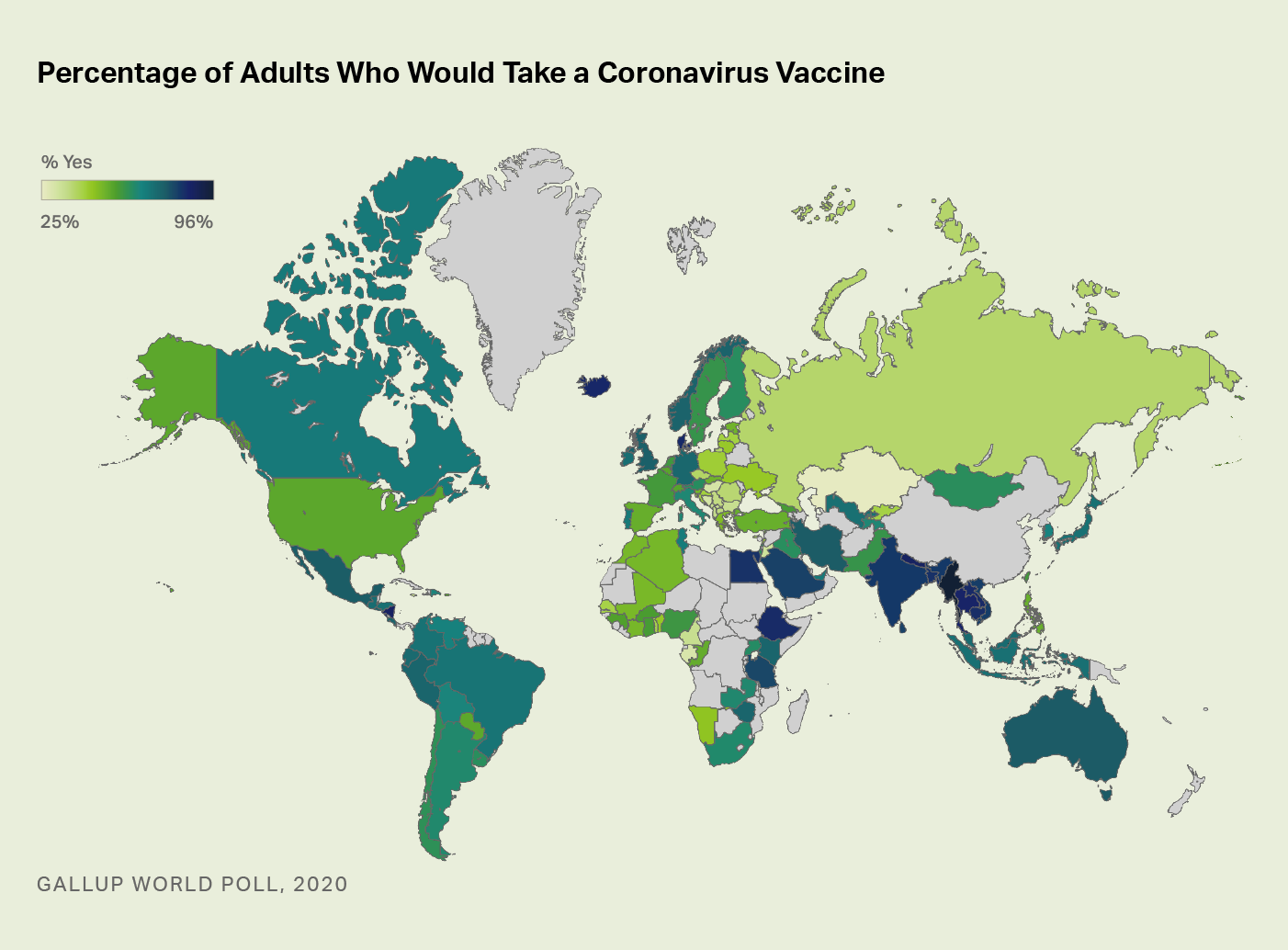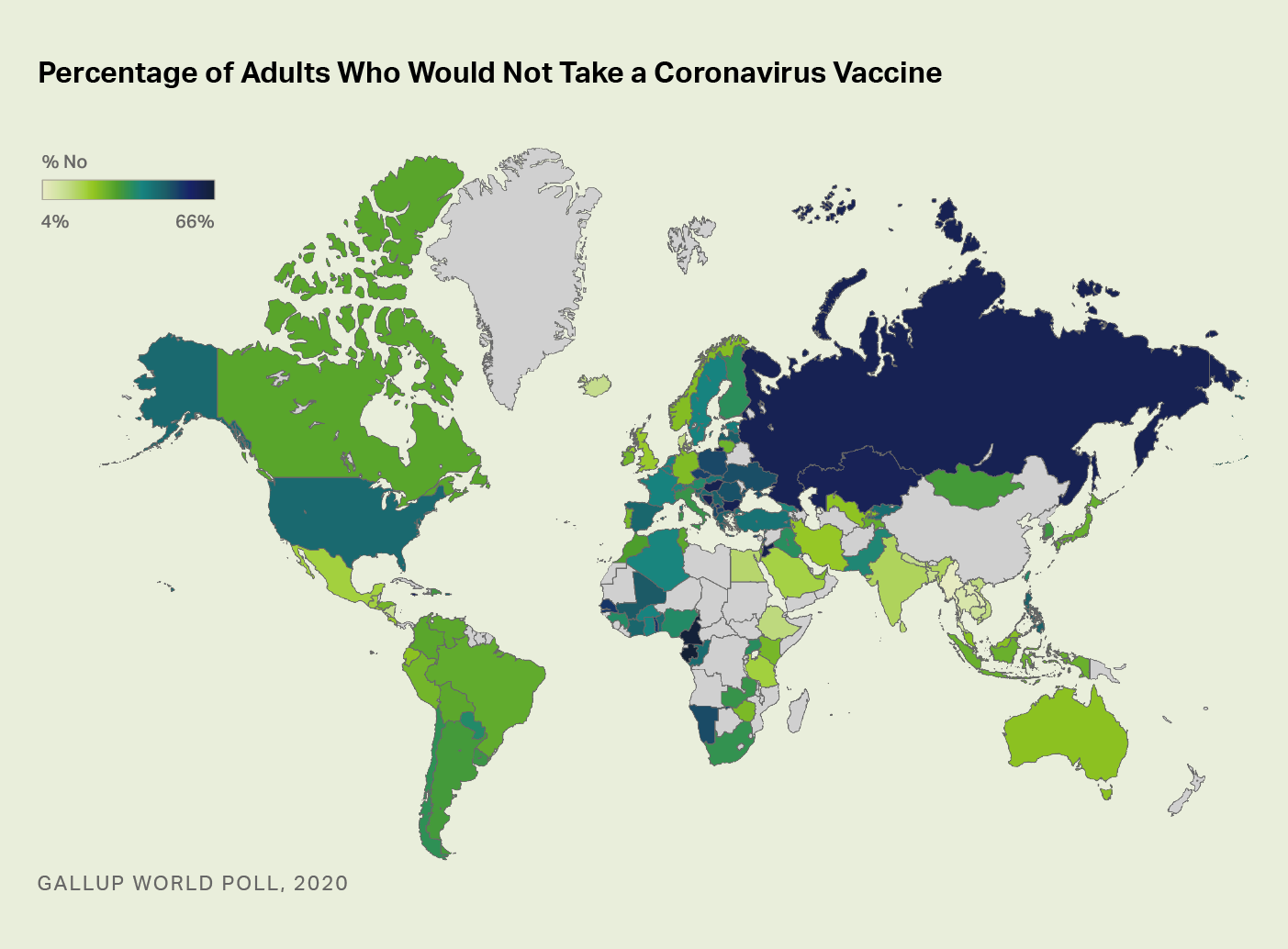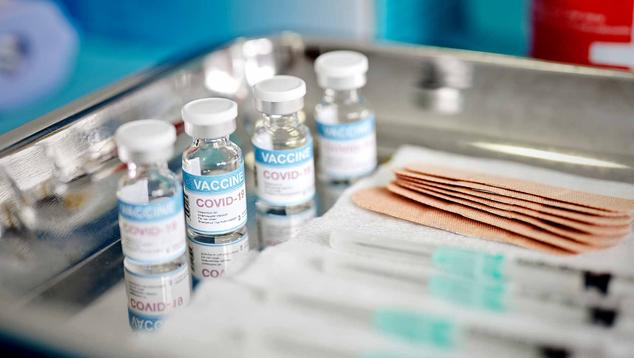Story Highlights
- 68% of adults worldwide willing to take vaccine last year
- Vaccine willingness ranged from 96% in Myanmar to 25% in Kazakhstan
- 32% of adults -- or 1.3 billion people -- would not take vaccine
WASHINGTON, D.C. -- In the first full year of the COVID-19 pandemic, the majority of adults worldwide (68%) told Gallup that they would agree to be vaccinated if a coronavirus vaccine were available to them at no cost. However, like the global number, in most countries, the percentages fell short of the estimated 70% to 90% that some experts say would need to be vaccinated to achieve herd immunity in a population.
People's willingness to take a vaccine for the coronavirus varied across the world in 2020, with the percentages saying they would take a vaccine ranging from a high of 96% in Myanmar to a low of 25% in Kazakhstan.
But importantly, if everyone who said they were willing to take the coronavirus vaccine actually did, just 38 of the 116 countries and areas that Gallup surveyed throughout the latter half of 2020 would reach the minimum 70% estimated threshold for achieving herd immunity. Only one country, Myanmar, would exceed the high-end estimate of 90%.

Heat map. Percentages worldwide who say they would take a vaccine for the coronavirus if it were made available to them at no cost.
In 15 countries, including India, which is currently dealing with a second catastrophic wave of the virus and where less than 10% of the population has received one dose, the percentage willing to take a coronavirus vaccine was between 80% and 89%. And in 22 others, including the United Kingdom, Germany and Brazil -- which is also dealing with a massive COVID-19 surge -- 70% to 79% were inclined to be vaccinated.
| 90% or higher | 80% to 89% | 70% to 79% | |||||||||||||||||||||||||||||||||||||||||||||||||||||||||||||||||||||||||||||||||||||||||||||||||
|---|---|---|---|---|---|---|---|---|---|---|---|---|---|---|---|---|---|---|---|---|---|---|---|---|---|---|---|---|---|---|---|---|---|---|---|---|---|---|---|---|---|---|---|---|---|---|---|---|---|---|---|---|---|---|---|---|---|---|---|---|---|---|---|---|---|---|---|---|---|---|---|---|---|---|---|---|---|---|---|---|---|---|---|---|---|---|---|---|---|---|---|---|---|---|---|---|---|---|---|
| % Yes | % Yes | % Yes | |||||||||||||||||||||||||||||||||||||||||||||||||||||||||||||||||||||||||||||||||||||||||||||||||
| Myanmar | 96 | Nepal | 87 | Tanzania | 79 | ||||||||||||||||||||||||||||||||||||||||||||||||||||||||||||||||||||||||||||||||||||||||||||||
| Nicaragua | 87 | Australia | 76 | ||||||||||||||||||||||||||||||||||||||||||||||||||||||||||||||||||||||||||||||||||||||||||||||||
| Thailand | 85 | Iran | 76 | ||||||||||||||||||||||||||||||||||||||||||||||||||||||||||||||||||||||||||||||||||||||||||||||||
| Iceland | 85 | Mexico | 75 | ||||||||||||||||||||||||||||||||||||||||||||||||||||||||||||||||||||||||||||||||||||||||||||||||
| Denmark | 85 | El Salvador | 75 | ||||||||||||||||||||||||||||||||||||||||||||||||||||||||||||||||||||||||||||||||||||||||||||||||
| Laos | 84 | United Kingdom | 75 | ||||||||||||||||||||||||||||||||||||||||||||||||||||||||||||||||||||||||||||||||||||||||||||||||
| Ethiopia | 84 | Costa Rica | 74 | ||||||||||||||||||||||||||||||||||||||||||||||||||||||||||||||||||||||||||||||||||||||||||||||||
| Cambodia | 84 | Norway | 74 | ||||||||||||||||||||||||||||||||||||||||||||||||||||||||||||||||||||||||||||||||||||||||||||||||
| Bangladesh | 83 | Kenya | 73 | ||||||||||||||||||||||||||||||||||||||||||||||||||||||||||||||||||||||||||||||||||||||||||||||||
| Egypt | 83 | Peru | 73 | ||||||||||||||||||||||||||||||||||||||||||||||||||||||||||||||||||||||||||||||||||||||||||||||||
| India | 82 | Zimbabwe | 73 | ||||||||||||||||||||||||||||||||||||||||||||||||||||||||||||||||||||||||||||||||||||||||||||||||
| Vietnam | 81 | Germany | 73 | ||||||||||||||||||||||||||||||||||||||||||||||||||||||||||||||||||||||||||||||||||||||||||||||||
| Mauritius | 81 | Ecuador | 72 | ||||||||||||||||||||||||||||||||||||||||||||||||||||||||||||||||||||||||||||||||||||||||||||||||
| Saudi Arabia | 80 | Malaysia | 72 | ||||||||||||||||||||||||||||||||||||||||||||||||||||||||||||||||||||||||||||||||||||||||||||||||
| Sri Lanka | 80 | Guatemala | 71 | ||||||||||||||||||||||||||||||||||||||||||||||||||||||||||||||||||||||||||||||||||||||||||||||||
| Ireland | 71 | ||||||||||||||||||||||||||||||||||||||||||||||||||||||||||||||||||||||||||||||||||||||||||||||||||
| Uzbekistan | 70 | ||||||||||||||||||||||||||||||||||||||||||||||||||||||||||||||||||||||||||||||||||||||||||||||||||
| Honduras | 70 | ||||||||||||||||||||||||||||||||||||||||||||||||||||||||||||||||||||||||||||||||||||||||||||||||||
| Indonesia | 70 | ||||||||||||||||||||||||||||||||||||||||||||||||||||||||||||||||||||||||||||||||||||||||||||||||||
| Japan | 70 | ||||||||||||||||||||||||||||||||||||||||||||||||||||||||||||||||||||||||||||||||||||||||||||||||||
| Colombia | 70 | ||||||||||||||||||||||||||||||||||||||||||||||||||||||||||||||||||||||||||||||||||||||||||||||||||
| Brazil | 70 | ||||||||||||||||||||||||||||||||||||||||||||||||||||||||||||||||||||||||||||||||||||||||||||||||||
| Gallup World Poll, 2020 | |||||||||||||||||||||||||||||||||||||||||||||||||||||||||||||||||||||||||||||||||||||||||||||||||||
Willingness Lowest in Eastern Europe, Former Soviet States -- Including Russia
Gallup's research on behalf of the Wellcome Global Monitor in 2018 showed people in Eastern Europe and former Soviet states were among the least likely in the world to believe vaccines in general are safe and effective -- before the pandemic. People in these two regions were also the least likely in 2020 to be willing to take the coronavirus vaccine -- 43% on average said they would in Commonwealth of Independent States countries, and 46% would in non-EU-member countries in Europe.
Many countries in these two regions -- including most of the Balkans -- and former Soviet states also dominate the list of places where people were the least willing to take a coronavirus vaccine if it were available at no cost.
For example, less than half of Russians in 2018 who had heard of vaccines (45%) agreed that they were safe, while a sizable 24% disagreed (one of the highest rates in the world). Fast-forwarding to shortly before their government rolled out its own coronavirus vaccine, called Sputnik V, domestically in December, 37% of Russians said they would take a coronavirus vaccine if offered, while 61% said they would not.
| % Yes | |||||||||||||||||||||||||||||||||||||||||||||||||||||||||||||||||||||||||||||||||||||||||||||||||||
|---|---|---|---|---|---|---|---|---|---|---|---|---|---|---|---|---|---|---|---|---|---|---|---|---|---|---|---|---|---|---|---|---|---|---|---|---|---|---|---|---|---|---|---|---|---|---|---|---|---|---|---|---|---|---|---|---|---|---|---|---|---|---|---|---|---|---|---|---|---|---|---|---|---|---|---|---|---|---|---|---|---|---|---|---|---|---|---|---|---|---|---|---|---|---|---|---|---|---|---|
| Czech Republic | 38 | ||||||||||||||||||||||||||||||||||||||||||||||||||||||||||||||||||||||||||||||||||||||||||||||||||
| Cyprus | 38 | ||||||||||||||||||||||||||||||||||||||||||||||||||||||||||||||||||||||||||||||||||||||||||||||||||
| Russia | 37 | ||||||||||||||||||||||||||||||||||||||||||||||||||||||||||||||||||||||||||||||||||||||||||||||||||
| Romania | 37 | ||||||||||||||||||||||||||||||||||||||||||||||||||||||||||||||||||||||||||||||||||||||||||||||||||
| North Macedonia | 35 | ||||||||||||||||||||||||||||||||||||||||||||||||||||||||||||||||||||||||||||||||||||||||||||||||||
| Serbia | 35 | ||||||||||||||||||||||||||||||||||||||||||||||||||||||||||||||||||||||||||||||||||||||||||||||||||
| Albania | 34 | ||||||||||||||||||||||||||||||||||||||||||||||||||||||||||||||||||||||||||||||||||||||||||||||||||
| Montenegro | 33 | ||||||||||||||||||||||||||||||||||||||||||||||||||||||||||||||||||||||||||||||||||||||||||||||||||
| Cameroon | 33 | ||||||||||||||||||||||||||||||||||||||||||||||||||||||||||||||||||||||||||||||||||||||||||||||||||
| Bulgaria | 33 | ||||||||||||||||||||||||||||||||||||||||||||||||||||||||||||||||||||||||||||||||||||||||||||||||||
| Kosovo | 32 | ||||||||||||||||||||||||||||||||||||||||||||||||||||||||||||||||||||||||||||||||||||||||||||||||||
| Jamaica | 32 | ||||||||||||||||||||||||||||||||||||||||||||||||||||||||||||||||||||||||||||||||||||||||||||||||||
| Jordan | 31 | ||||||||||||||||||||||||||||||||||||||||||||||||||||||||||||||||||||||||||||||||||||||||||||||||||
| Bosnia and Herzegovina | 30 | ||||||||||||||||||||||||||||||||||||||||||||||||||||||||||||||||||||||||||||||||||||||||||||||||||
| Hungary | 30 | ||||||||||||||||||||||||||||||||||||||||||||||||||||||||||||||||||||||||||||||||||||||||||||||||||
| Gabon | 29 | ||||||||||||||||||||||||||||||||||||||||||||||||||||||||||||||||||||||||||||||||||||||||||||||||||
| Kazakhstan | 25 | ||||||||||||||||||||||||||||||||||||||||||||||||||||||||||||||||||||||||||||||||||||||||||||||||||
| Gallup World Poll, 2020 | |||||||||||||||||||||||||||||||||||||||||||||||||||||||||||||||||||||||||||||||||||||||||||||||||||
Majorities in 20 Countries and Areas, Including Russia, Would Refuse
Nearly three in 10 (29%) worldwide said they would not agree to be vaccinated, and another 3% said they did not know or refused to answer; together, these translate into roughly 1.3 billion adults who were unwilling to be vaccinated at the time of the survey.

Heat map. Percentages worldwide who say they would not take a vaccine for the coronavirus if it were made available to them at no cost.
Efforts to vaccinate people will clearly face much stronger headwinds in some countries than others. Majorities of adults in nearly two dozen countries and areas worldwide firmly said they would not agree to be vaccinated. Further, people in many of these countries have yet to see more than 2% of their population vaccinated.
Unsurprisingly, the list includes Russia and countries in Eastern Europe where few people said they would take vaccines, but it is led by sub-Saharan African countries Gabon and Cameroon, where two-thirds of the populations would not take vaccines if offered. Majorities in Senegal, Togo and Namibia also said they would not take the vaccine.
| % No | |||||||||||||||||||||||||||||||||||||||||||||||||||||||||||||||||||||||||||||||||||||||||||||||||||
|---|---|---|---|---|---|---|---|---|---|---|---|---|---|---|---|---|---|---|---|---|---|---|---|---|---|---|---|---|---|---|---|---|---|---|---|---|---|---|---|---|---|---|---|---|---|---|---|---|---|---|---|---|---|---|---|---|---|---|---|---|---|---|---|---|---|---|---|---|---|---|---|---|---|---|---|---|---|---|---|---|---|---|---|---|---|---|---|---|---|---|---|---|---|---|---|---|---|---|---|
| Gabon* | 66 | ||||||||||||||||||||||||||||||||||||||||||||||||||||||||||||||||||||||||||||||||||||||||||||||||||
| Cameroon* | 65 | ||||||||||||||||||||||||||||||||||||||||||||||||||||||||||||||||||||||||||||||||||||||||||||||||||
| Jordan | 62 | ||||||||||||||||||||||||||||||||||||||||||||||||||||||||||||||||||||||||||||||||||||||||||||||||||
| Hungary | 61 | ||||||||||||||||||||||||||||||||||||||||||||||||||||||||||||||||||||||||||||||||||||||||||||||||||
| Bulgaria | 61 | ||||||||||||||||||||||||||||||||||||||||||||||||||||||||||||||||||||||||||||||||||||||||||||||||||
| Bosnia and Herzegovina* | 61 | ||||||||||||||||||||||||||||||||||||||||||||||||||||||||||||||||||||||||||||||||||||||||||||||||||
| Russia | 61 | ||||||||||||||||||||||||||||||||||||||||||||||||||||||||||||||||||||||||||||||||||||||||||||||||||
| Kazakhstan | 61 | ||||||||||||||||||||||||||||||||||||||||||||||||||||||||||||||||||||||||||||||||||||||||||||||||||
| Jamaica | 59 | ||||||||||||||||||||||||||||||||||||||||||||||||||||||||||||||||||||||||||||||||||||||||||||||||||
| Kosovo* | 56 | ||||||||||||||||||||||||||||||||||||||||||||||||||||||||||||||||||||||||||||||||||||||||||||||||||
| Senegal | 55 | ||||||||||||||||||||||||||||||||||||||||||||||||||||||||||||||||||||||||||||||||||||||||||||||||||
| Togo* | 54 | ||||||||||||||||||||||||||||||||||||||||||||||||||||||||||||||||||||||||||||||||||||||||||||||||||
| Cyprus | 54 | ||||||||||||||||||||||||||||||||||||||||||||||||||||||||||||||||||||||||||||||||||||||||||||||||||
| Czech Republic | 53 | ||||||||||||||||||||||||||||||||||||||||||||||||||||||||||||||||||||||||||||||||||||||||||||||||||
| North Macedonia | 53 | ||||||||||||||||||||||||||||||||||||||||||||||||||||||||||||||||||||||||||||||||||||||||||||||||||
| Albania* | 52 | ||||||||||||||||||||||||||||||||||||||||||||||||||||||||||||||||||||||||||||||||||||||||||||||||||
| Poland | 52 | ||||||||||||||||||||||||||||||||||||||||||||||||||||||||||||||||||||||||||||||||||||||||||||||||||
| Namibia* | 51 | ||||||||||||||||||||||||||||||||||||||||||||||||||||||||||||||||||||||||||||||||||||||||||||||||||
| Lebanon | 51 | ||||||||||||||||||||||||||||||||||||||||||||||||||||||||||||||||||||||||||||||||||||||||||||||||||
| Ukraine* | 51 | ||||||||||||||||||||||||||||||||||||||||||||||||||||||||||||||||||||||||||||||||||||||||||||||||||
| * = 2% or less of the population receiving one dose as of late April 2021 | |||||||||||||||||||||||||||||||||||||||||||||||||||||||||||||||||||||||||||||||||||||||||||||||||||
| Gallup World Poll, 2020 | |||||||||||||||||||||||||||||||||||||||||||||||||||||||||||||||||||||||||||||||||||||||||||||||||||
Looking Ahead
Because the surveys were conducted throughout 2020, countries were at various stages of the pandemic, but in most countries, vaccines had yet to be rolled out to the public. It is reasonable to expect that attitudes may have shifted since, as vaccines have become available to more people.
For example, opinions toward vaccines in the U.S. have changed over the past year. Barely a majority of Americans (53%) at the time of the 2020 World Poll in September and October said they would agree to be vaccinated, which was in line with Gallup's other domestic polling at the same time.
However, by March 2021 -- a few months into vaccine rollouts -- 74% of Americans said they would take one of the FDA emergency-approved vaccines for the coronavirus if it were available at no cost, and 26% said they would not.
Even if people's attitudes elsewhere have shifted as they have in the U.S., these data still provide some sense of the resistance that countries are likely facing with the public during their vaccine rollouts. This is on top of the logistical challenges involved in mass vaccination efforts. As that process continues across the U.S. and the rest of the world, the challenge will eventually shift from meeting the needs of those willing to be vaccinated to building support among the somewhat sizable populations that likely remain hesitant.
See all country-level results on this question (PDF download).
View the country dataset details (PDF download).
Learn more about how the Gallup World Poll works.




